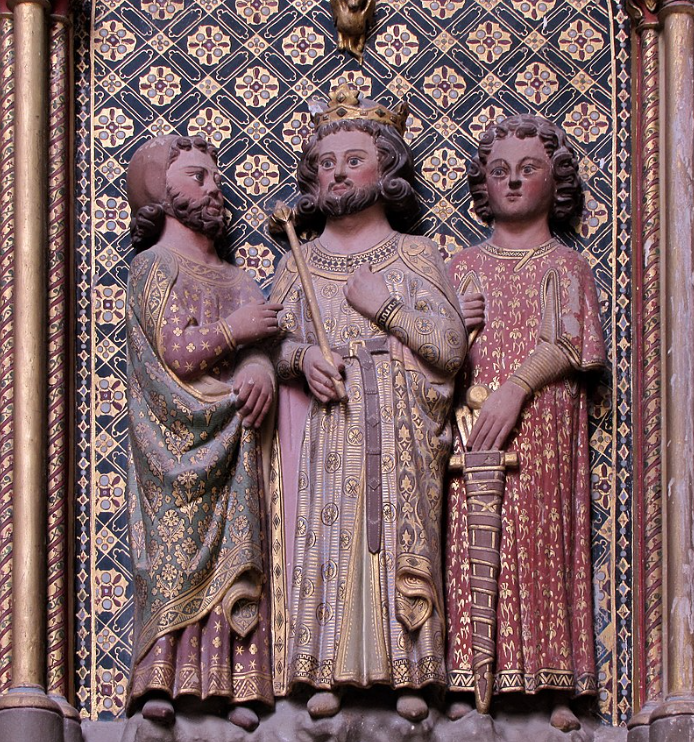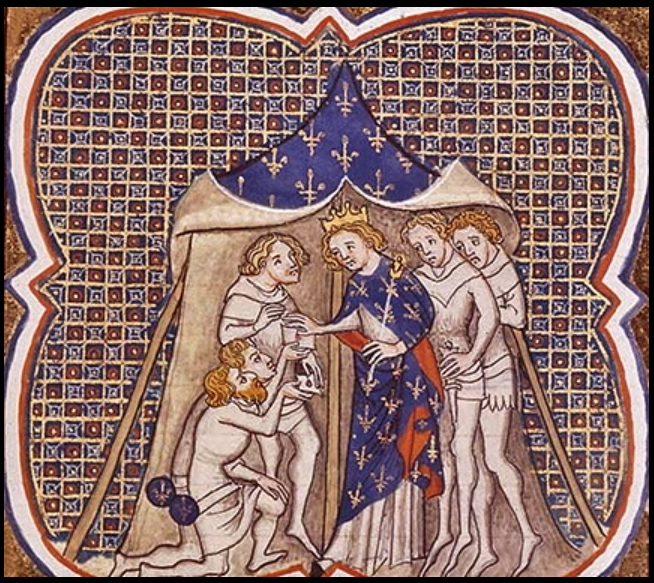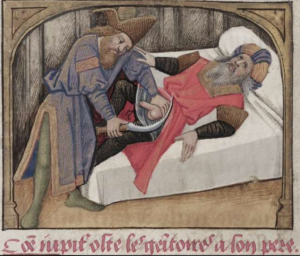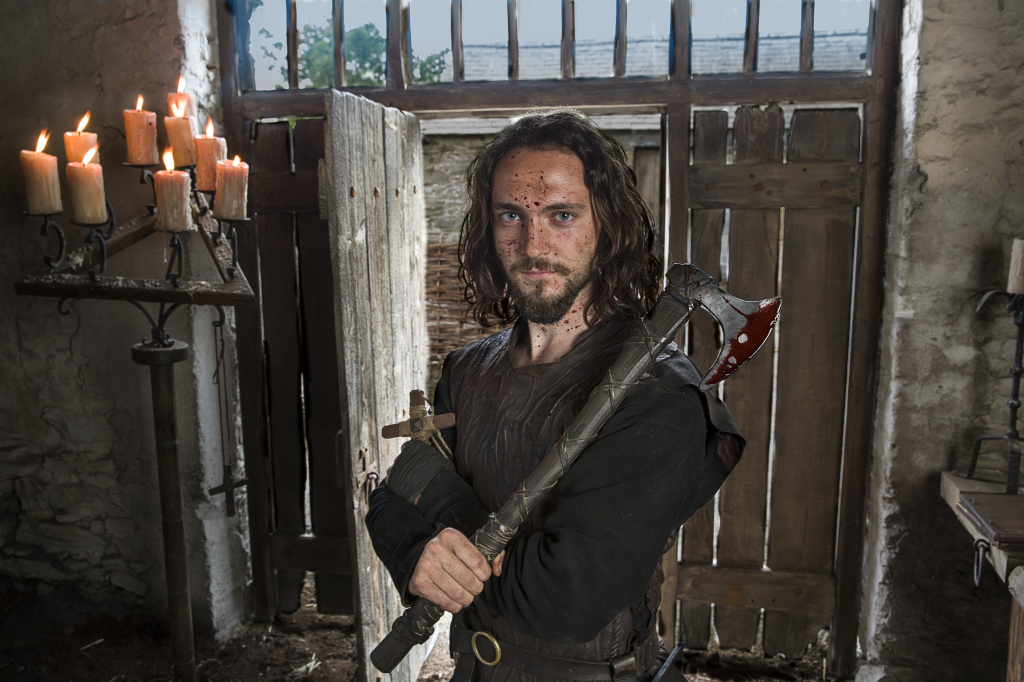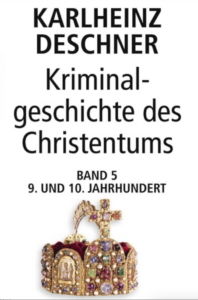Criminal History, 196
For the context of these translations click here.
PDFs of entries 1-183 (several of Karlheinz Deschner’s
books abridged into two) can be read here and here.

Arnulf of Carinthia.
Arnulf of Carinthia: East Franconia and the East
Arnulf of Carinthia (c. 850-899) was the eldest illegitimate offspring of the Bavarian king and king of Italy, Carloman, the eldest son of Louis the German and his mother Liutwind, apparently a Luitpoldinger. In addition to his lawful wife Ota, Arnulf had several concubines and had no shortage of children out of wedlock, which did not bother the clergy. On the contrary, the prince, who was thoroughly devout to the Church, was favoured by the community of saints just as much as he favoured them, even though he renounced an anointing.
‘Hail Arnolf, the great king’
From the very beginning, there was a close relationship between the bishops and the new lord, who once called himself the ‘most determined opponent’ of all enemies of the Church, in a document the ‘son and defender of the Catholic Church’, to which he also signalled his benevolence immediately after his elevation through donations and graces. He ‘conspicuously generously’ endowed the bishops with royal estates, forests, minting, market and customs rights with a ‘previously unknown frequency’ (Fried). He convened five synods during his reign of just over 12 years. The authority of the prelates was desirable to him against the rising particular powers. Moreover, it could sanction his illegitimate kingship.
The Church, on the other hand, benefited from the ruler’s power in the conflict with the dukes and the high hereditary nobility. For this reason it immediately supported him, had him prayed for from the outset and immediately interceded for his protection under threat of ecclesiastical punishment. But of course, it also made him aware of the duties of a Christian ruler. And by supporting him, the Church supported itself. Thus began a development that gave the church more say than ever before, with all the fatal consequences that this entailed, making it ‘the most powerful in the state’ (Mühlbacher).
While there is no evidence of counts in the king’s entourage for many years, a series of bishops, many of whom were favoured by the king, continued to tip the political balance. First Archbishop Thietmar of Salzburg, Arnulf’s arch chaplain, head of the court chapel and chancellery; later increasingly the chancellor and deacon Aspert, made bishop of Regensburg by Arnulf in 891, and his successor as chancellor (from 893), Bishop Wiching of Neutra. A key politician close to the ruler was the intelligent and cunning Hatto I of Mainz, whose death (913) was attributed by some to an avenging lightning bolt. Hatto came from a Swabian family, partisans of Charles, but immediately sided with Arnulf after the emperor’s fall and was rewarded by him with the abbeys of Reichenau, Ellwangen, Lorsch and Weissenburg, and in 891 with the archbishopric of Mainz. The prelate accompanied the king to Italy twice and intervened in all important public issues. The bishops Salomon III of Constance (notary since 884, chancellor of Charles III since 885, already Arnulf’s chaplain in 888), Waldo of Freising, Erchanbald of Eichstätt, Engilmar of Passau and the high noble Adalbero of Augsburg, whom Arnulf made his son’s tutor, also carried considerable political weight.
In May 895, at the imperial assembly at Tribur, the royal palace near Mainz, at one of the largest and most brilliant synods of the century, the unusually numerous East Frankish episcopate celebrated Arnulf effusively as the king, ‘whose heart’, according to the Synodal Acts, ‘the Holy Spirit inflamed with fire and kindled with the fervour of divine love so that the whole world might recognise that he was chosen not by man and through man, but by God himself’. Old sayings of the prelates. For whom they choose, whom they support, is always from God (i.e., from them)!
At the synod, which according to Regino von Prüm ‘was held against many secularists who endeavoured to diminish the authority of the bishops’, the bishops were all the more eager to increase their authority. They discussed in detail legal disputes between clergy and laity, the mistreatment of clerics, and their wounding or killing, which occurred more frequently than before—even a blinded priest was allowed to appear. One canon contains the king’s order to arrest those who despised the church, whereby the killing of rebels did not cost any defence money! Furthermore, complete submission to the papacy is demanded, ‘even if a hardly bearable yoke is imposed by the Holy See’! Several chapters are devoted to the most important things, money, property, tithes, and church robbers. According to chapter 7, stolen church property is to be replaced threefold, and this concerning the pseudo-Isidoric forgeries (which are also referred to in other canons, such as 8 and 9, but on the other hand orders that presenters of forged papal letters be taken into custody).
Naturally, the king approved the resolutions. Indeed, in response to the rhetorical question as to how much he ‘deigned to defend the Church of Christ and to extend and exalt her ministry’, he first encouraged the ‘shepherds’, also apostrophised as the ‘brightest lights of the world’, to take vigorous action themselves ‘be it in season or out of season, punish, rebuke, admonish with all patience and teaching, so that in watchful care and through unceasing admonition, you may drive the sheep of Christ to the door of eternal life’. But then he emphasised all his solidarity. ‘In me, you have the most determined opponent of all those who are hostile to the Church of Christ and rebellious to your priestly ministry.’ No wonder the venerable Council Fathers rose from their seats and, together with the surrounding clergy, shouted three or four times: ‘Christ, hear us, hail Arnolf, the great King’. (Doesn’t it remind us of the cry of salvation that still rings in our ears?) In addition, the ringing of bells, the Tedeum, all in praise of God, ‘who has deigned to give his holy church such a pious and mild comforter and such a valiant helper for the honour of his name’.
The ruler particularly venerated his patron saint, under whom he even rose to become the patron saint of the empire, a saint of the realm.
______ 卐 ______
Editor’s Note: This is all background on how, over the centuries, the Aryan collective unconscious was forcibly implanted with the malware that has now mutated into a psychotic Wokism (cf. everything I have said on this site about Tom Holland’s work).
It is background because granting such a dimension of power to a human institution cannot but brainwash the white man through a ‘heard mentality’, ‘mass formation’ or whatever you want to call it.

